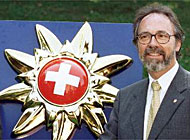Dick Marty: the man who brought parliament to Ticino

The idea of holding a session of the Swiss Parliament in Lugano was conceived by Dick Marty, the president of Switzerland Tourism. He was elected in 1995 to the Swiss Senate after eight years as a member of the government in canton Ticino.
Before becoming involved in politics, Marty had a distinguished career as a magistrate, taking a close interest in the fight against organised crime and drug trafficking.
“My suggestion to hold a session of the Federal Parliament in Italian-speaking Switzerland was inspired by a similar session held in Geneva in 1993, which did much to improve relations between that canton and the Confederation.
It was always going to be a bold move given the austere, traditional context of Swiss national politics, but after meeting the President of the State Council of the Canton of Geneva, Carlo Lamprecht, I decided it was worth pressing ahead.
Among other things, Lamprecht told me how the session had helped the rest of Switzerland better understand the special role played by canton Geneva in relations with international institutions. Previously, Swiss links with the world bodies based there had been somewhat overlooked and not given enough consideration in federal policy making, despite the obvious national interest involved.
I realised that in the case of Italian-speaking Switzerland, the Federal Government in Bern has only a vague idea of what goes on in Ticino, and the canton in turn also has only a limited understanding of the mechanisms of national politics.
It seems to me that a poor knowledge of a subject can be worse than knowing nothing about it at all, because it leads to misunderstandings, ambiguities and, consequently, prejudices. In my view, there are definitely misunderstandings and prejudices – on both sides – in the relationship between Italian-speaking Switzerland and the rest of the Confederation.
Of course, holding a session in Ticino won’t solve all the existing problems, but it can contribute to better mutual understanding and awareness, particularly at such a delicate a moment in the nation’s history.
The traditional solidarity on which our federal cultural policy has been built seems increasingly to be giving way to a fundamentally selfish vision based on the affirmation of regional interests. The peripheral areas, such as Italian-speaking Switzerland, are in greater danger of being marginalised.
Part of the reason has to do with globalisation, which is intensifying competition at all levels, and threatening to compromise the delicate balances that have enabled our country to grow harmoniously despite its cultural diversity.
I believe that a country also needs powerful symbolic occasions – and not just healthy public finances! – to reaffirm its identity. I’m sure that the presence of representatives of central government – parliamentarians, ministers, high-ranking civil servants and the media – for three weeks in Lugano will do more than merely enhance the reputation of Ticinesi risotto and Merlot, as some people have suggested.
The parliamentary session in Lugano – an occasion for serious work, informative meetings and also times of friendly socialising – is above all a good opportunity to reflect on the values of so composite and culturally diverse a country as Switzerland.
It is also an opportunity to foster a dialogue – not just a state of co-existence – between the country’s different regions. This is an occasion for Switzerland to realise just how valuable and essential Italian culture is to its identity. At the same time, Ticino will be able to reaffirm, with greater strength of conviction, that it is profoundly Swiss.”
Dick Marty

In compliance with the JTI standards
More: SWI swissinfo.ch certified by the Journalism Trust Initiative
You can find an overview of ongoing debates with our journalists here. Please join us!
If you want to start a conversation about a topic raised in this article or want to report factual errors, email us at english@swissinfo.ch.